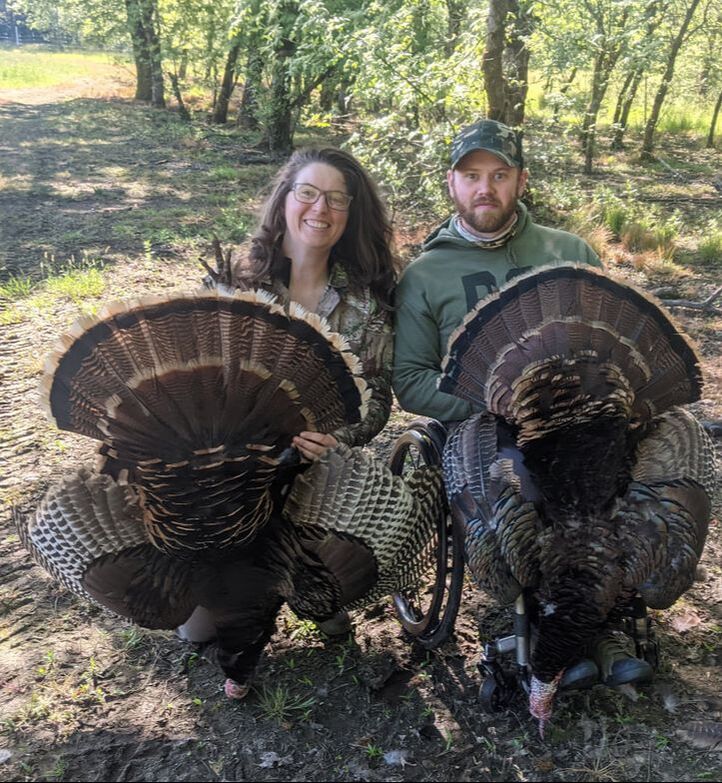“100 yards, at the edge of the hay field.” I whispered.
The day before, in this same spot, two jakes had flown down right in front of me, spotted Frankie (my decoy), and charged in. I had shot one of the jakes, and I was hoping that this morning the other jake would do the same thing for Matt. But, of course, he did not. He did roost in the same tree, but he’d stayed in that tree gobbling for a whole HOUR past when he and his buddy had flown down yesterday. He was suspicious. While we heard gobbling in every direction at dawn, we couldn’t chase the other gobblers as they were off the small property on which we had permission to hunt. We had to stay put and call this gobbly, tree-dwelling rascal in!
After 2 hours of gobbling up in his tree, silence. Five minutes later I spotted him out in the hay field at 100 yards. His head was just poking up over the tall grass, and he was staring in our direction. I pulled out my tail fan and tried to entice him closer, but he was not having it. After a few more gobbles, he moseyed off. Matt was crestfallen, but with so many gobblers calling in the area, I had hope. Plus this was the only local spot we had to hunt. We stayed put and did what you do while waiting for turkeys. We napped, snacked, farted, and listened for gobbles. Every 10-15 minutes, I gave a yelp on the slate call.
Around 9 am, my yelp was answered by a gobble less than 100 yards away. I told Matt to get ready. As I peeked out of the blind, the turkeys started pouring into the hay field 70 yards away, three hens followed by two big gobblers. I knew it would be hard to get the gobblers to leave the hens, but that was where Frankie came in. After ten minutes and some more sexy yelps on my part, one gobbler came close enough to see Frankie and charged! He galloped in at a half strut, chest feathers shaking.
“Wait until he stops and sticks his head up.” I whispered.
At 15 yards, the gobbler slowly circled Frankie preparing for the fight, paused, and BOOM Matt shot.
As the gobbler flopped on the ground, the second tom charged in, even faster than the first. I had my gun on him as he circled and aggressively pecked his buddy. Then he turned on Frankie. The old gobbler jumped straight up, kicked his left leg out, and spurred Frankie.
“Where are the hens?” I asked Matt, who had a better view from his wheelchair. I could hear a hen yelping, but I couldn’t see it.
“10 yards to the side of the gobbler. You’ve got a clear shot.”
But the gobbler wasn’t picking his head up. His head was down, pecking my sweet Frankie! I couldn’t take it anymore. I opened my mouth and gave a soft yelp. He rose up and looked around. BOOM. Second turkey down. I flipped the blind up and ran to the birds. Two perfect neck/head shots on two adult toms.
Matt wheeled over, and we giggled with excitement, admiring the beautiful birds. The landowner walked around the corner of the barn and held up two fingers, silently asking if we’d killed two. We nodded, waved him over, and chatted for a few minutes. He was very excited for us and snapped our photo. He thanked me for the handmade cards I’d given his wife the day before. Seeing Matt’s wheelchair, he suggested I drive right up to Matt and the birds. As we loaded up, I couldn’t believe our luck. We’d killed four birds that weekend on private land in the Willamette Valley! Matt killed his first and second birds after many years of unsuccessful turkey hunting. Those unsuccessful years were before I knew Matt. We’d only been dating 6 months when this turkey season started!
Turkey hunting is HARD, and it’s especially hard for people with disabilities. Matt uses a wheelchair fulltime due to his spinal cord injury. He had a very successful turkey season this year due in large part to a collaboration between Oregon Department of Fish and Wildlife, Pheasants Forever, and landowners. This collaboration provided the public with accessible hunts on private property in the Willamette Valley. Before daylight, we were able to park by the landowner’s barn and walk/wheel 150 yards down a level, hard-packed farm path to our hunting spot. It was not a large property, but it was large enough! Additionally, the landowner knew how the birds moved, and by communicating that to us, he helped us have a successful hunt without scouting. We got out on a beautiful morning in mid-May, heard a great deal of gobbling, and the birds cooperated. These types of collaborations have the potential to provide many memorable and equitable hunting opportunities for hunters with disabilities and able-bodied hunters with limited access to public or private land. This great new program shows what can be accomplished when we work together. Our heartfelt thanks go out to all the partners who made that morning one we will never forget. Thank you!

 RSS Feed
RSS Feed
